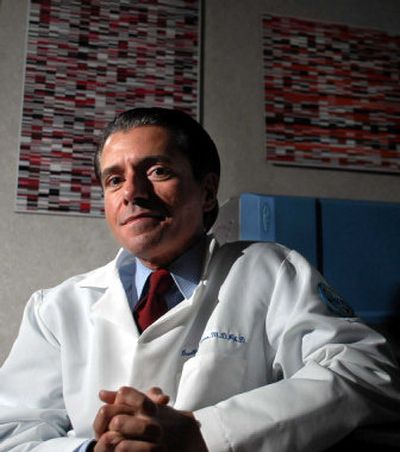Warding off disaster

Patients at the Institute of Living at Hartford Hospital in Hartford, Conn., can now get a DNA test that can predict whether they are at risk for side effects from antidepressants and whether a drug is likely to work.
Within a few years at Hartford Hospital, cardiologists hope to offer similar genetic screens to patients before they are prescribed cholesterol-lowering drugs, high blood pressure medication or anti-coagulants.
“We hope to find a quantitative method of evaluating drugs rather than just flying by the seats of our pants,” said Dr. William Boden, director of the hospital’s division of cardiology.
Such genetic tests are “seat belts for drugs,” said Dr. Gualberto Ruano, president and chief executive of Genomas Inc., a Hartford biotechnology company that is marketing the tests.
Ruano equates the practice of prescribing drugs without genetic screening for safety and efficacy to driving a car without seat belts. While the automotive industry initially balked at installing seat belts, they quickly became standard equipment, he said.
As genetic tests evolve, they have the potential to predict and prevent side effects, such as those that forced the arthritis drug Vioxx off the market.
“There is no reason to wait for disasters anymore,” Ruano said.
Several often-overlooked facts about drugs underscore the benefits of such screening tests, he said.
The first is that people react differently to medications. With most drugs on the market, there will be a percentage of people who derive little or no benefit and a percentage who suffer side effects. The percentages vary with each drug. Yet doctors still have no sure way of predicting which patient will respond poorly to a drug or not at all, Ruano said.
One of the goals of Genomas and other companies marketing “personalized medicine” technology is to help doctors gain a better handle on individual differences.
To profile a patient’s DNA, Genomas relies upon nanotechnology, which involves the use of minute materials at the atomic scale. In this case 200,000 different “nanoprobes” made up of 6 million microscopic beads attach to specific regions of a patient’s DNA. Researchers then can compare the individual’s genetic characteristics to genetic data on drug response in larger populations, to identify whether the patient might be at risk of an adverse reaction to a specific medication.
Not all of the genetic variations that combine to determine a patient’s response to a particular drug are known. However, the effects of variations of some genes – such as the cytochrome P450, or the CYP family of enzymes – on drug metabolism are well-documented. Variations of the CYP enzymes play a crucial role in determining how well the liver processes active components in most antidepressants.
For instance, variations in a few of the CYP enzymes mean that some people cannot effectively break down many antidepressants. For these patients, the standard dose will be too high and put them at greater risk of nausea and sexual dysfunction, two known side effects of antidepressants.
Alternately, a percentage of people metabolize these drugs too quickly, so the antidepressants are unlikely to have much, if any, benefit for them.
Identifying such high- and low-metabolizers would be a huge benefit for psychiatrists because only about 60 percent of depressed patients respond to an initial prescription of antidepressants, said Dr. John Goethe, director of the Burlingame Center for Psychiatric Research and Education at the Institute of Living.
Through trial and error, 85 percent eventually respond to antidepressant therapy but that does not mean that those patients are free of side effects or that the treatments alleviate all symptoms of disease, Goethe said. Genetic screens offer a chance to fine-tune prescriptions, saving money and misery.
“Many are either burdened by side effects or burdened by residual symptoms of depression because they haven’t fully recovered,” Goethe said.
He recommends that his patients be tested for variations of the CYP genes, but only a few patients so far have opted for the tests because it is still unclear whether insurance companies will pick up the tab, which can run between $250 and $500 per test, he said.
DNA profile tests can also resolve questions about some more complex drug reactions, Ruano said.
For instance, a family of drugs known as atypical anti-psychotics has been linked to the development of diabetes in some schizophrenics. The affected patients tend to be young and physically healthy.
The Institute of Living and Genomas, backed by grants from the National Institutes of Health, plan to search for genetic variations that might account for the reaction in some schizophrenics.
Ruano says cholesterol-lowering drugs called statins have a good safety record, but in high doses they have been linked to muscle wasting in some patients. DNA profiling could help identify which patients would be at increased risk.
The genetic tests also could one day help doctors prescribe the optimum drug for a specific patient with hypertension, and identify which patients face a high risk of excessive bleeding after taking anti-coagulants, Ruano said.
“A lot of people are hot on this approach,” Boden said. “It’s the wave of the future and we are on the ground floor.”